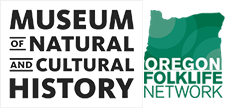Jason Jaeger (Adel) is a custom rawhide braider and cattle rancher. He cuts his own rawhide strings to braid into reins and hackamores, and he builds his own cores for reatas. Jaeger makes collector quality cowboy gear (including chinks, chaps, reins, and hackamores) for everyday use.
Bio
Jason Jaeger (Adel) is a custom rawhide braider and cattle rancher. He cuts his own rawhide strings and builds his own cores for reatas. Jaeger makes collector quality cowboy gear (including chinks, chaps, reins, and hackamores) for everyday use. Jaeger, who grew up on a ranch in Condon, OR, runs the Three Crosses Cattle Ranch in Lake County. He went to Oregon State University for a BS in Animal Science and has ridden colts for ranches in southern Oregon, ridden racehorses in Kentucky, and now runs his local Grazing Association among his other activities. He’s also a trained EMT.
Although Jaeger first learned to tool leather from his mother's high school teaching partner, Frank Burns, he credits Bill Black with teaching him to cut his own string (strips of rawhide), braid, and weave knots or “buttons” (intricately woven knots that adorn and provide weight and balance to gear to make custom hackamores, reins, and reatas. Jaeger met Black when he was about 17 when Jaeger was working for ranchers Bill and Candy Bowerman.
After college, Jaeger worked as a ranch hand in Adel and caught up with Bill and Theresa Black, who had moved to Plush, Oregon, about 40 miles away. Jaeger, whose work was to check up on heifers during the night, explained, “Well, during the day, you got nothing to do, so I would go up to Bill’s; . . . he's really good about teaching somebody.” Jaeger went from building chaps to a set of rawhide reins, and then a hackamore. “And then I got to the point where it's making a little bit of money and I was able to build my own shop and have my own little business inside. And then that side of business kind of became my job for a while.” A riding injury sidelined his full-time braiding business, but he does maintain his shop and supervises those who work for him.
Jaeger prides himself on scraping his own hides, something Black instilled in him. He prefers hides from thin red cows, which provide a light colored, opaque leather. He starts, as Black taught him, by scraping off the hair with a metal stick or wire brush after soaking the hide in water and wood ash or lime, which softens the hide and makes it easier to scrape.” Once the hair is off, the hide needs to be soaked. “So you throw it in the crick, to get it soft again and then we cut it in either at three quarter or a half inch strip. And then you take it through the splitter,” which removes any lingering fat, “and then I take it back out and stretch it again one more time to get all the stretch out of the string, and then coil that up, and get it wet again, and then you go and start cutting your individual strands.”
Jaeger finds that most of his business is making hackamores and reins. A nice pair of reins can take up to 40-50 hours to make, while a hackamore takes around 20 hours. Despite the time investment, he prefers “the reins, there's more variables you can use different patterns, different styles. And people like hackamores, but the guys who use the reins just appreciate it more when they're nice." Good braiding is evident from the evenness of the strings and “the smoothness of the knots And it's pretty evident when you if you look at very much rawhide, how much time and effort they put in, that all the work that happens before. You know, is their string good, how did they prep their string, how do they cut their string, how are the bevels on the string? Is it thick, is it thin, . . . [are they] using quality hides or are they just trying to get stuff out?”
Jaeger has taught braiding and partnered with Bill Black, Joe Benner, and others in the region for workshops in Oregon and Idaho.

